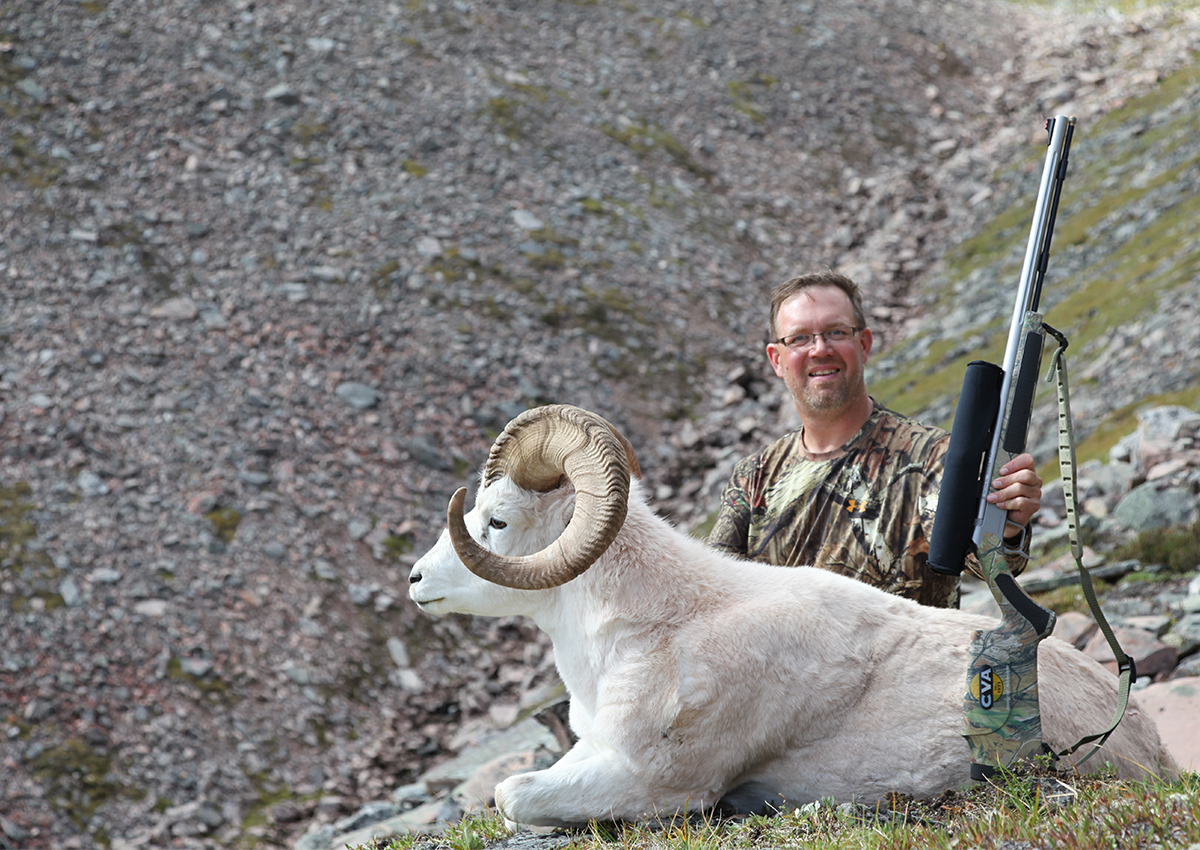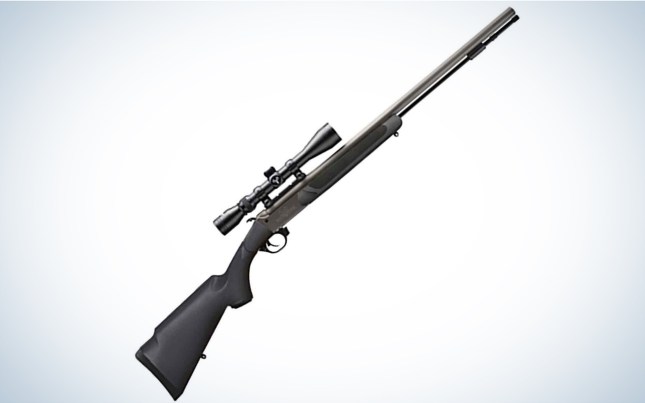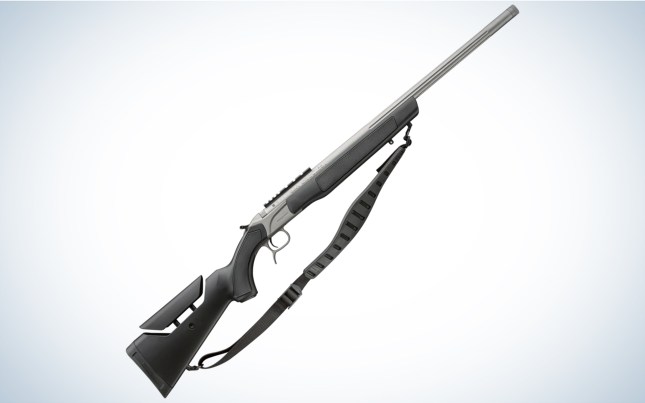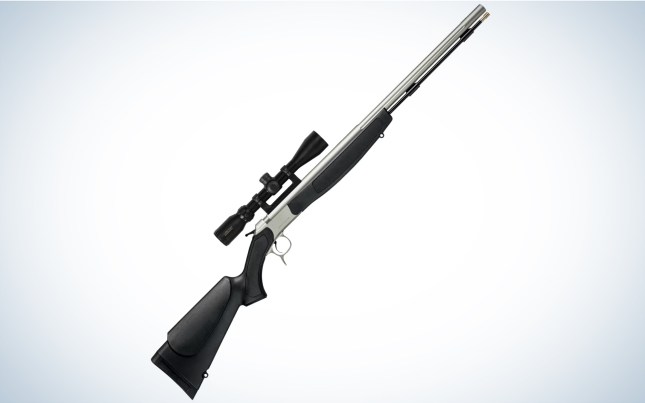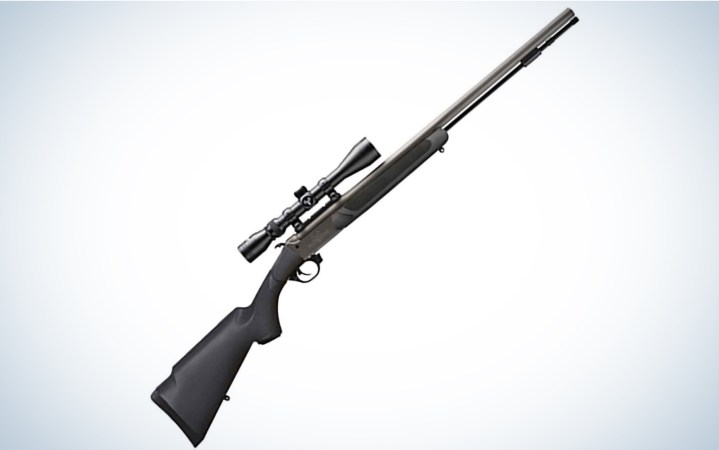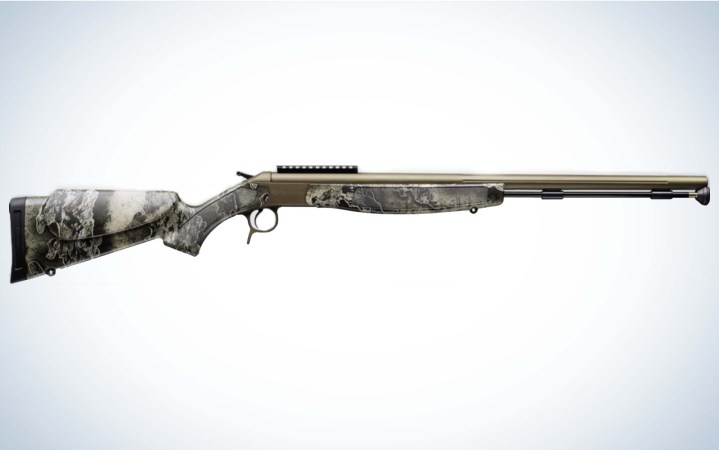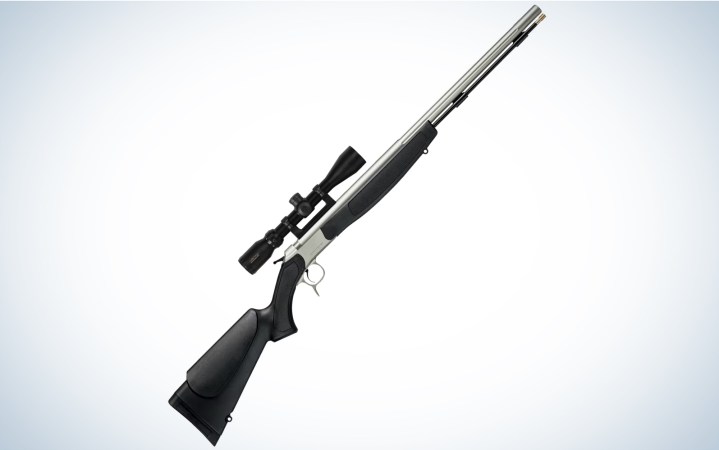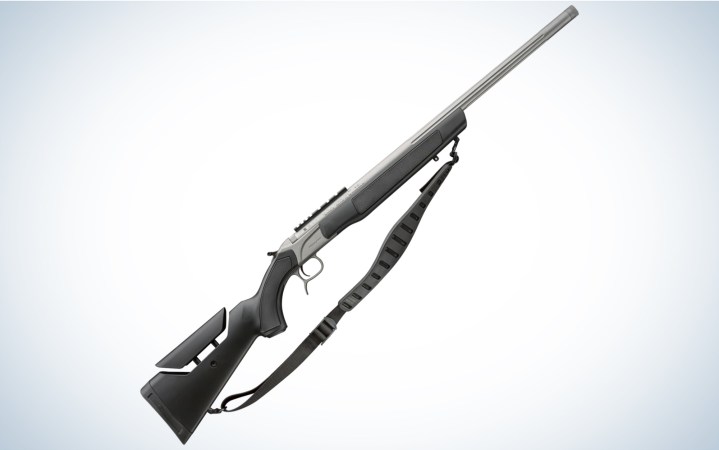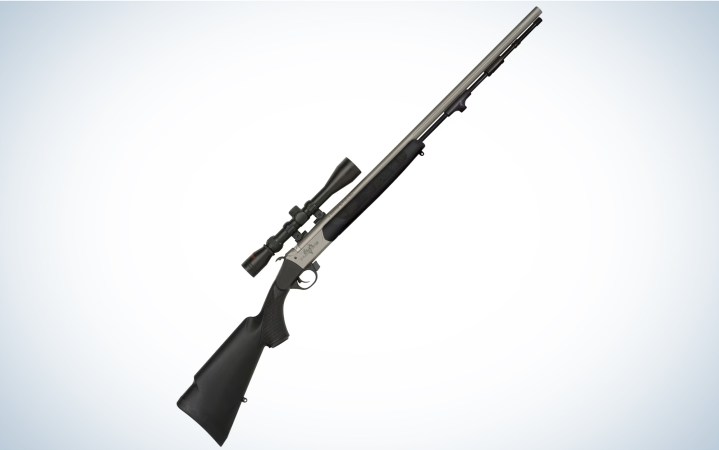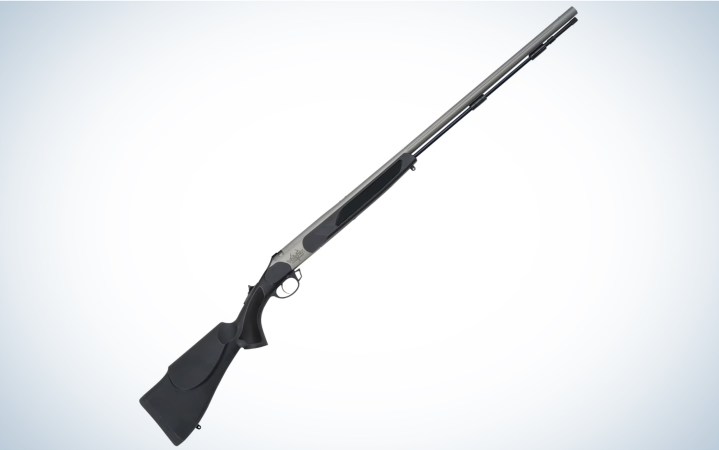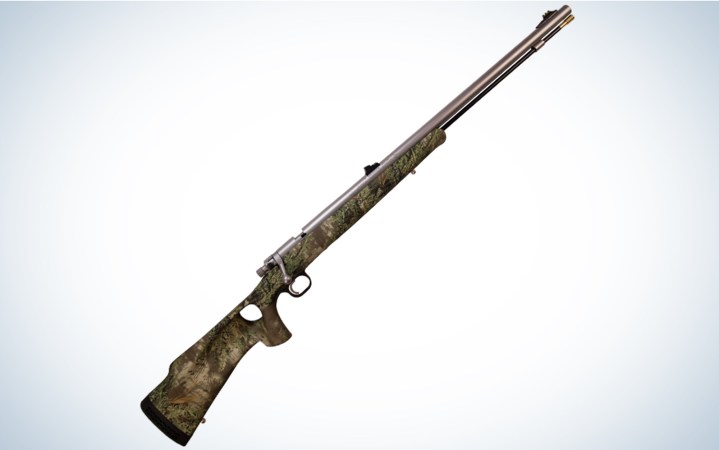We may earn revenue from the products available on this page and participate in affiliate programs. Learn More ›
The rising sun sent shards of orange, violet, and red pastel light across the eastern sky on a morning muzzleloader deer hunt in the Sandhills of Nebraska. A big buck, his nose to the ground, was oblivious to our pursuit. We hurried to a rise where we last saw him, and as we crested the hill, tall white antlers came into view at 156 yards. The buck caught up to the hot doe he was trailing, whom another suitor was already courting. While the deer were busy posturing and trying to determine dominance, I leveled my scope on the big boy, cocked the hammer, and gently squeezed the trigger. He ran about 30 yards and crashed. The other buck rounded up his lady and headed for safer country while I went to grasp the tines of a buck I just harvested with the newest technology to hit the market.
Current muzzleloader options are nothing short of outstanding. Your main decision comes down to whether you want convenience or performance beyond traditional inline muzzleloaders. Some models are known for their reliability, while others break new ground in terms of design and performance. Here is a list of the best muzzleloaders available today.
- Most Consistent Shooting: Traditions NitroFire
- CVA Crossfire
- Most Reliable: CVA Optima V2
- Best for Backcountry Hunts: CVA Accura MR
- Best Value: Traditions Pursuit XT
- Best Hammerless Long Range: Traditions Vortek StrikerFire VAPR
- Best .52 Caliber: Knight Disc Extreme
How I Chose the Best Muzzleloaders
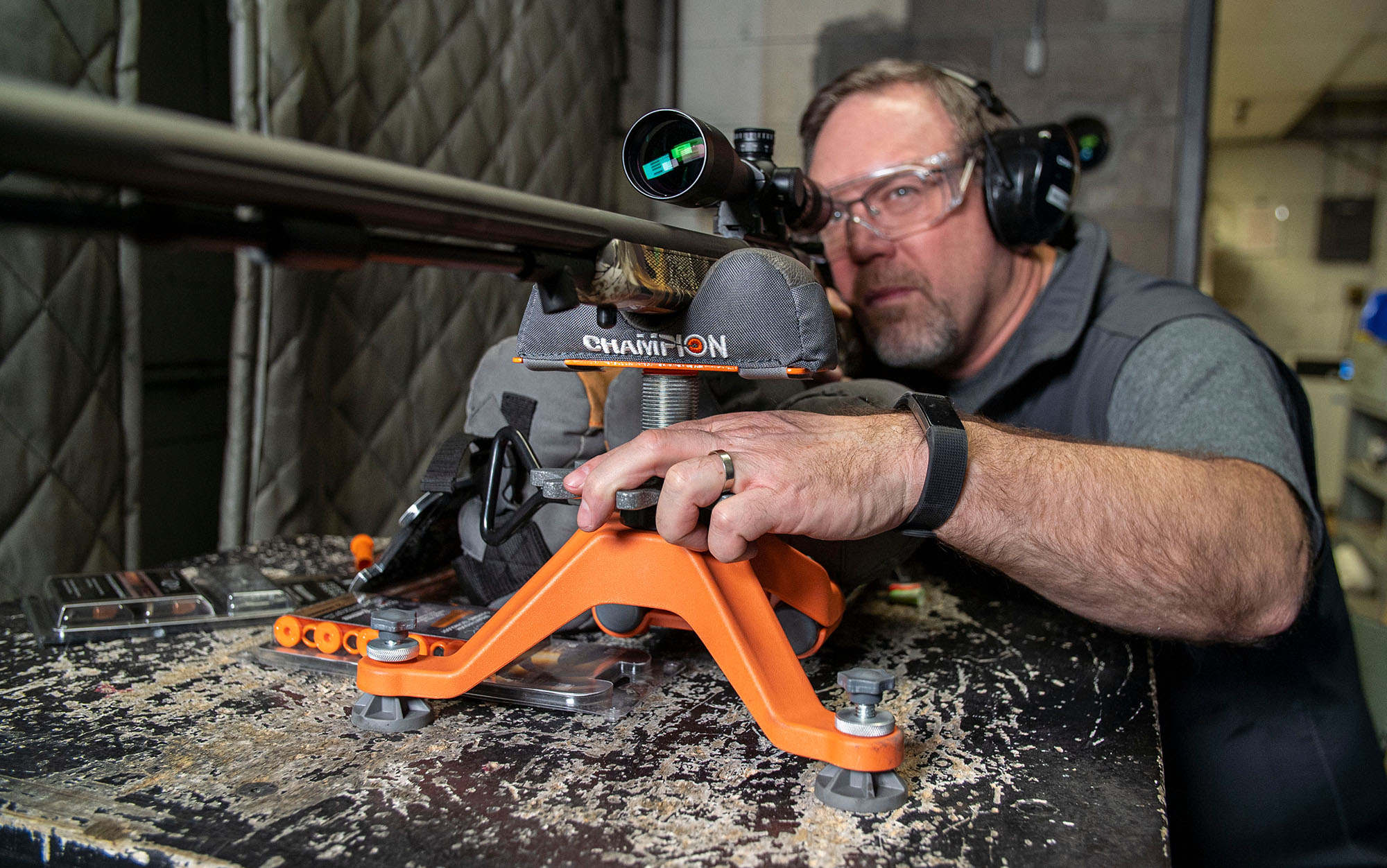
All the muzzleloaders were shot at the range of sight-in optics and tested for consistency and accuracy. The modern muzzleloaders proved there isn’t a bad apple in the bunch. All of the best muzzleloaders can shoot sub-MOA with consistent loading and cleaning; the most significant variant is the shooter’s capability. The real test for most muzzleloaders was in the field hunting. The only muzzleloader I haven’t hunted with yet is the new Crossfire.
Best Muzzleloaders: Reviews and Recommendations
Most Consistent Shooting: Traditions NitroFire
Key Features
- FireStick compatible
- 1:24-inch twist rifling
- 26-inch barrel
- Dual safety system
- Price: $500-$731
Accuracy Results
- Smallest group .375 inches
- Largest group 1.625 inches
- Average group 1.167 inches
Pros
- Fast and easy loading and unloading
- A bullet shelf in the barrel means proper seating for every shot
- Faster 1:24 twist that stabilizes bullets to increase accuracy and rangeunload
- Easy to clean
Cons
- Some jurisdictions question if a NitroFire is still a muzzleloader
- The NitroFire only takes FireStick charges with no other powder options
Traditions continue to be innovative and push engineering and technologies to produce intuitive and safe muzzleloaders—the accuracy and consistency rival centerfire rifles. Traditions was the first company to manufacture a muzzleloader that used FireStick technology with the NitroFire. The NitroFire line has several models, but the newest has a VAPR Twist barrel with 1:24-inch twist rifling. The faster twist stabilizes bullets in flight, making them accurate at longer distances.
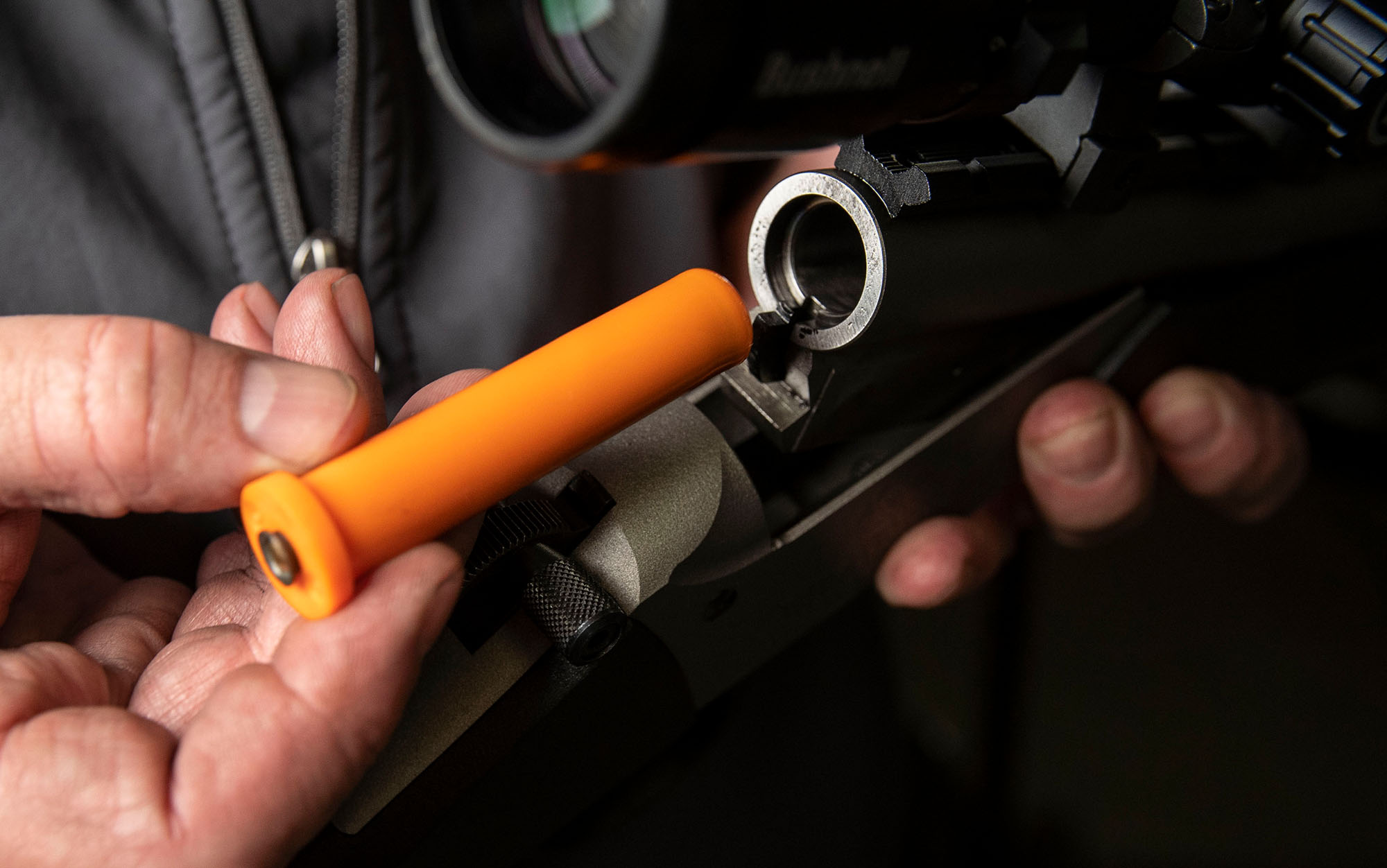
The newest NitroFire is intuitive to use but also features a Premium Cerakote finish to increase accuracy, and decrease cleaning and any chance of corrosion.
The NitroFire muzzleloader is .50 caliber and has a 26-inch ultralight Chromoly steel fluted and tapered barrel with 1:24-inch twist rifling called VAPR. The rifle includes components like the Dual Safety System and Traditions’ new Elite XT trigger system. The trigger system has a rebounding hammer, a captive half-cock, and manual cross-block trigger safety. The Elite XT trigger allows the action to be broken open with the cross-bolt safety engaged. You can load or unload the muzzleloader and view the chamber. The NitroFire is available in ten configurations of finishes and optics options.
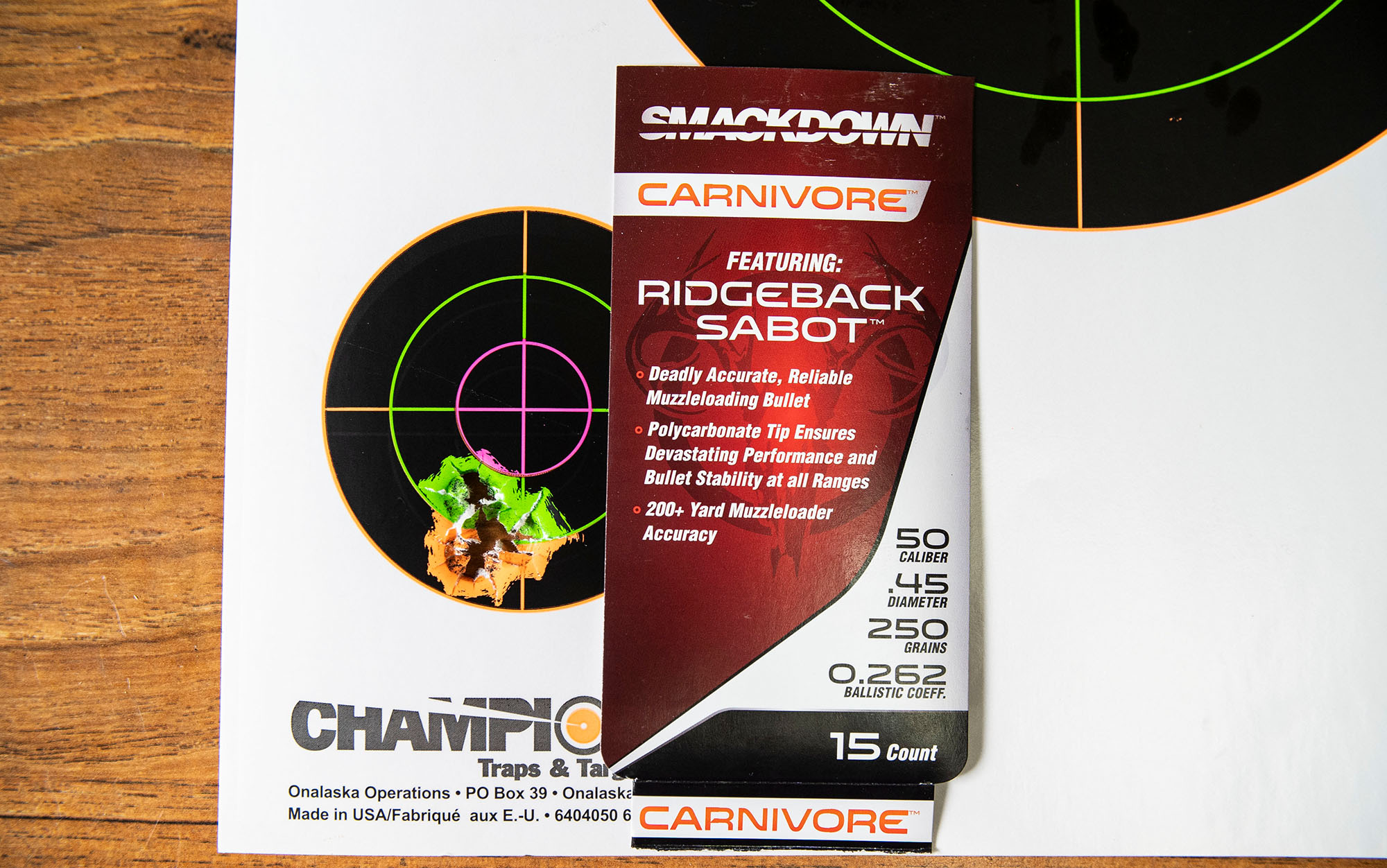
A chronograph was set up 10 feet from the barrel to record the velocity of five shots, with Federal Premium Muzzleloader 209 primers as the ignition source. The Traditions Smackdown Carnivore 250-grain bullet with sabot produced the following results.
- High velocity: 1,997 fps
- Low velocity: 1,953 fps
- Mean velocity: 1,973 fps
- Variance: 44 fps
Three groups of three shots at 100 yards averaged 1.16 inches using a 100-grain FireStick and Traditions Smackdown Carnivore 250-grain bullet.
The accuracy was impressive, and the system provides many advantages to a muzzleloader hunter or shooter while simultaneously increasing safety.
CVA Crossfire
Key Features
- Uses FireStick technology
- Weight: 8 pounds
- .50 Caliber
- Twist Rate: 1:28 inches
- 26-inch barrel
- Price: $450-$575
Pros
- Fast loading
- Does not have to be shot to unload
- Easy to clean
Cons
- Some jurisdictions question if a Crossfire is still a muzzleloader
- The Crossfire only takes FireStick charges with no other powder options
Utilizing the FireStick technology is becoming the standard for modern inline muzzleloaders, and the Crossfire is CVA’s first to utilize it. The market demands consistent and accurate muzzleloaders, and removing human error or inaccuracies in powder handling and measuring is hard to ignore.

The Crossfire was proven accurate with PowerBelt bullets. No breech plug and fewer parts means cleaning and maintenance are a breeze. It’s also easy to load and shoot. The CVA Crossfire is a .50 caliber that still loads the bullet down the rifle’s muzzle. The 80, 100, or 120-grain charge loads from the breech, with the shooter adding a 209 primer to complete loading.
Most Reliable: CVA Optima V2
Key Features
- .50 caliber
- Barrel Length: 26 or 28 inch
- Ambidextrous thumbhole or standard stock
- Weight: 6.65 pounds
- Lifetime warranty
Pros
- Reasonable price
- Breech plug doesn’t require removal tool
- Ambidextrous stock
Cons
- O-ring to maintain in the breech plug
- Length of pull (14 inches) is not adjustable
CVA introduced the Optima V2 in 2013 after the popularity of CVA’s Accura V2. Both rifles feature the same trigger-guard actuated breeching lever, internal parts, a balanced trigger, and a Quick Release breech plug. This value-driven rifle shot groups at the range of .70 to 2.50 inches. The group sizes varied from shooter to shooter, but with sound fundamentals it will shoot around 1-inch groups.
CVA has mastered the breech plug by creating one that is easy to remove and clean without using a tool. Even after prolonged shooting, the breech threads out easily, never seizing due to specially designed O-rings that prevent blowback into the threads or primer chamber. The design of the breech ensures consistent ignition, keeping your primer and powder safe from moisture. Safety features built into the breech mean that if it is not entirely threaded into the barrel, the shooter cannot close the break-action of the rifle. The ease with which the breech can be removed and put back in makes it simple to clean and maintain.
Best for Backcountry Hunts: CVA Accura MR
Key Features
- Barrel Lengths: 25, 27, 28, 30 inches
- .45 or .50 caliber
- Bergara barrel
- Quick release breech plug
- Weight: 6.75 pounds
Pros
- Compact
- Nitride coating prevents corrosion
- Lightweight
- Easy to clean
Cons
- Recoil management isn’t the best
- Shorter barrels can cause muzzle jump with magnum loads
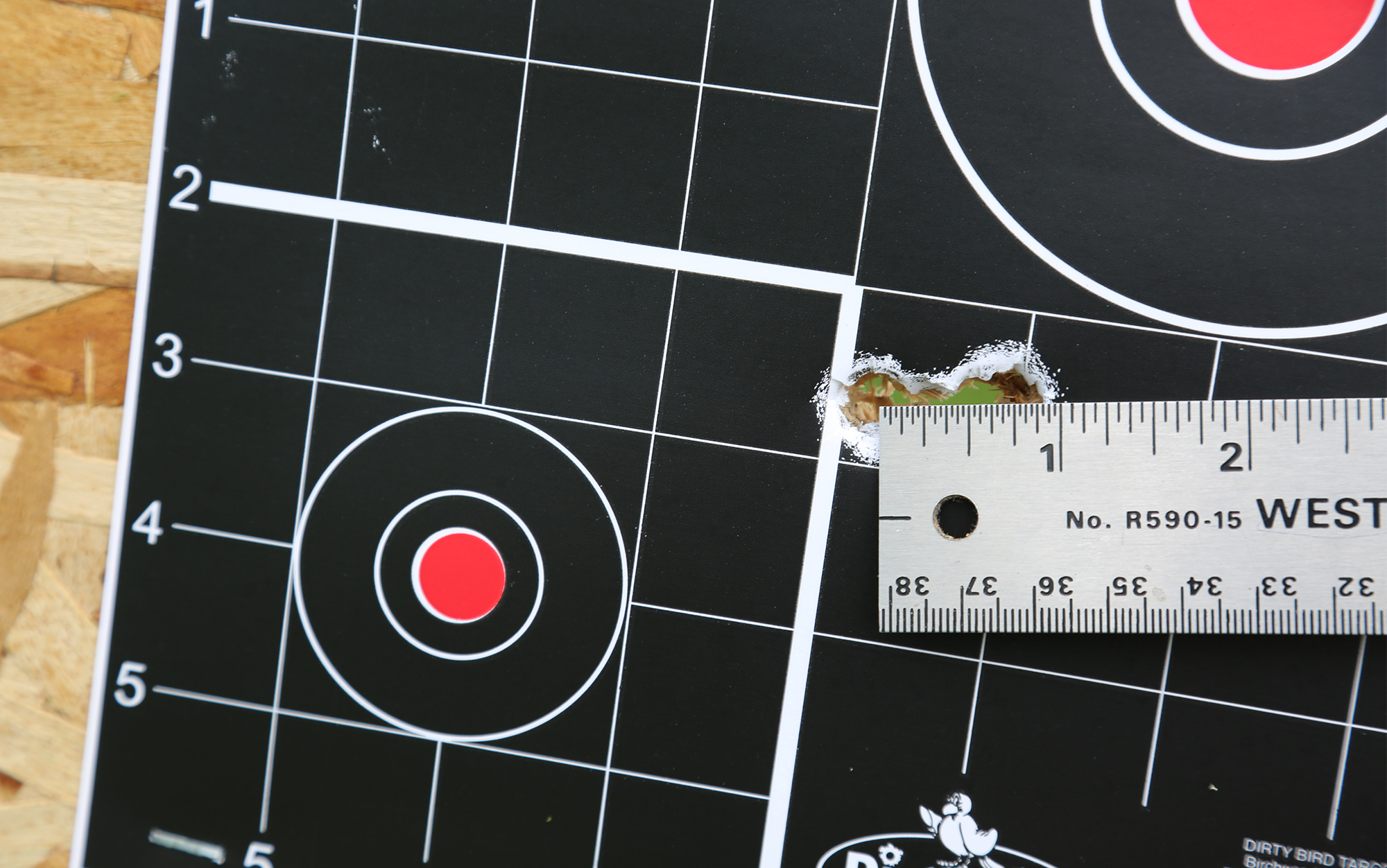
The Accura MR is a break-open muzzleloader that operates with the hinge release lever built into the trigger guard. It features a 25-inch Bergara barrel with a 1:28 twist rifling. Nitride treatment inside and out ensures the entire length is weather and corrosion-resistant, which makes it one of the best muzzleloaders to carry in variable backcountry conditions. The list of features on this firearm is impressive, from the Bergara barrel, Quick Release Breech Plug, Trigger Guard Actuated Breeching Action, Palm Saver ramrod, and Neutral Centre of Gravity Trigger. The MR comes with a matching Quake Claw Sling, SoftTouch stock with rubber grip panels, and DuraSight DEAD-ON one-piece scope mount.
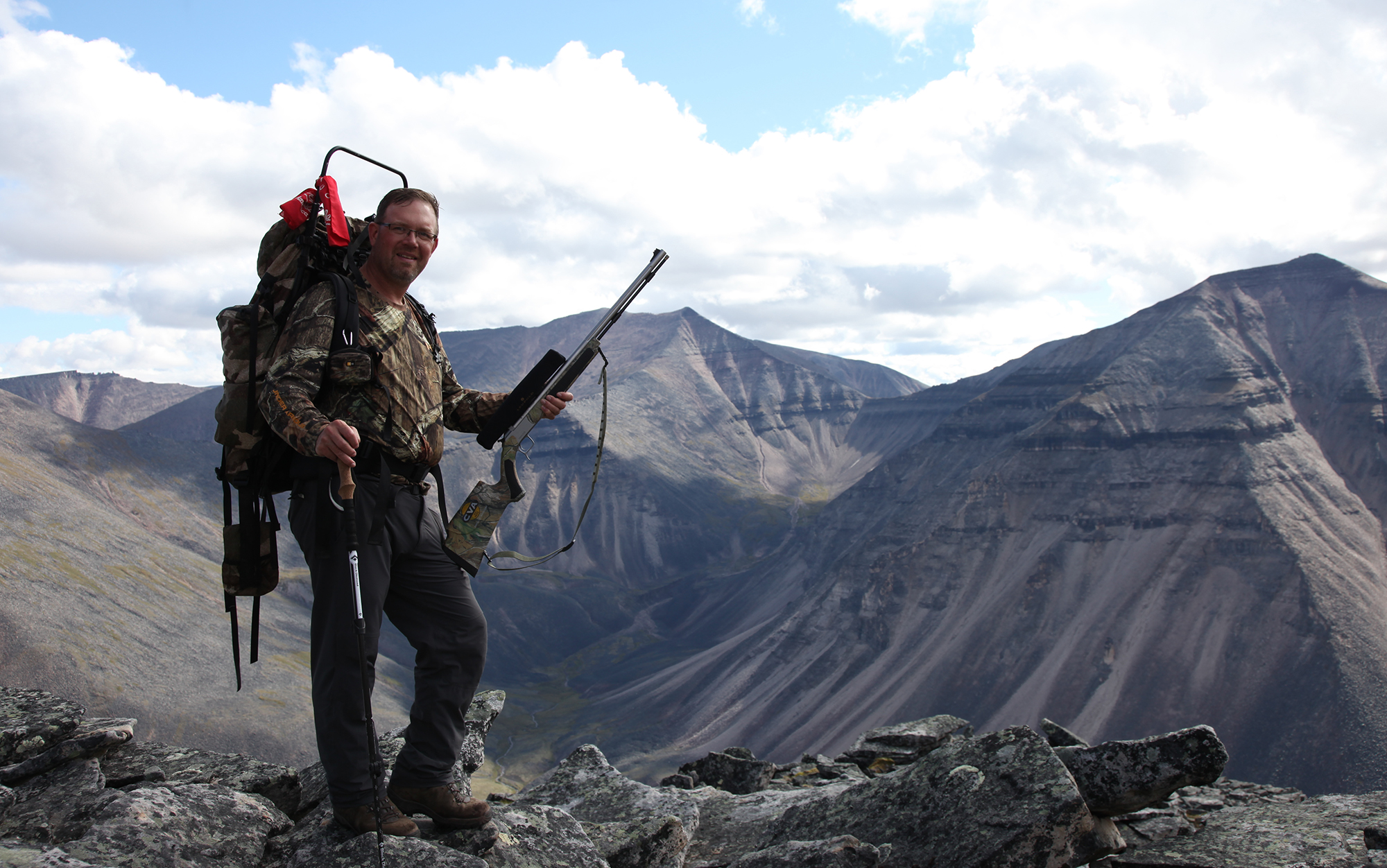
I dreamed of hunting Dall sheep when I was a young boy. With a new CVA ACCURA V2, I headed for the Mackenzie Mountains in Canada’s Northwest Territories. Weeks on the range had me shooting sub-MOA groups at 200 yards. The rifle was accurate, consistent, and easy to use and maintain. After days of packing, I shot my dream ram at 213 yards with a single, well-placed shot.
Best Value: Traditions Pursuit XT
Key Features
- Chromoly steel barrel
- Available in .45 and .50 caliber
- Barrel Length: 26 inches
- 1:24 VAPR twist
- Weight: 5.75 pounds
Pros
- Reasonable price
- Dual safety system
- Quick reload
Cons
- Ignition and breech plug cleaning are time-consuming
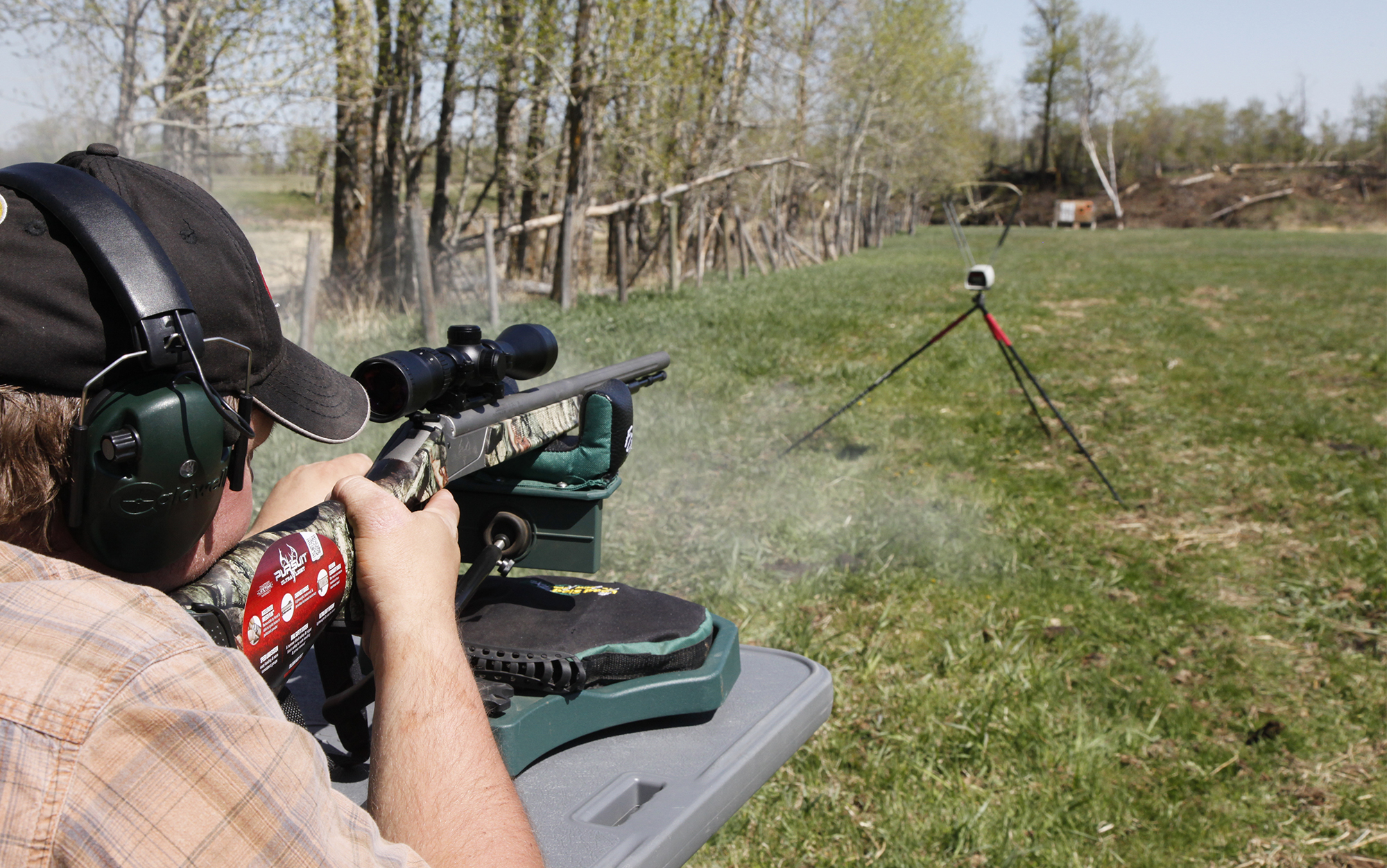
The Pursuit XT has an Elite XT trigger system, rebounding hammer, and manual cross-block trigger safety. With a cocking hammer and trigger safety, it is one of the safest options on the market. It has standard features like a 26-inch Chromoly steel barrel, Dual Safety System, and Accelerator Breech Plug Speed Load System. This rifle is accurate to 200 yards and beyond with blackpowder substitutes like Pyrodex. The Pursuit XT shot 100-yard groups sub MOA to 1.75 inches.
I have shot deer and black bears with the Pursuit XT and was impressed with the performance and reliability of the rifle and components.
Best Hammerless Long Range: Traditions Vortek StrikerFire VAPR
Key Features
- 1:20 VAPR twist
- Barrel Length: 28 inches
- Sealed breech
- Available in .45 and .50 cal
Pros
- Silent cocking with slide mechanism
- Better bullet stability means long-range accuracy
- Clean, crisp trigger break
Cons
- Breech and ignition maintenance isn’t efficient
The silent cocking button on the Traditions Vortek StrikerFire slides forward until it locks, putting the gun in fire mode. A red dot is uncovered when the slide is locked and lets the shooter know the gun is ready to fire. The firearm is uncocked by pushing the spring release button behind the slide to let the mechanism glide back to the safe position. No external hammer offers faster lock time and a more silent operation.
Traditions’ newest offering, the .45 caliber, offers long-range shooters ballistic and barrel technical advantages. The StrikerFire is still a traditional inline muzzleloader that uses standard black powder equivalent charges and a sabot and bullet. It offers advantages without having to use extreme powder charges. This series features a Chromoly steel barrel, premium CeraKote finish, TAC-2 Trigger System, Hogue Comfort Grip Overmolding, Dual Safety System, and Accelerator Breech Plug, which removes by hand and allows for the use of loose or pelletized powder. Speed Load System, sealed breech, lightweight composite stock, and tight barrel tolerance make this model an excellent choice for any weather conditions.
Read Next: Best Muzzleloader Scopes
Best .52 Caliber: Knight Disc Extreme
Key Features
- Plastic disk holds 209 primers for loading
- Weight: 7.8 pounds
- 1:26 barrel twist
- Also available in .50 cal
- Laminate wood stock
- Green Mountain barrel
Pros
- Green Mountain American-made barrel
- Durable stock
Cons
- Discs can take extra time to load
- Disassembly required for proper cleaning
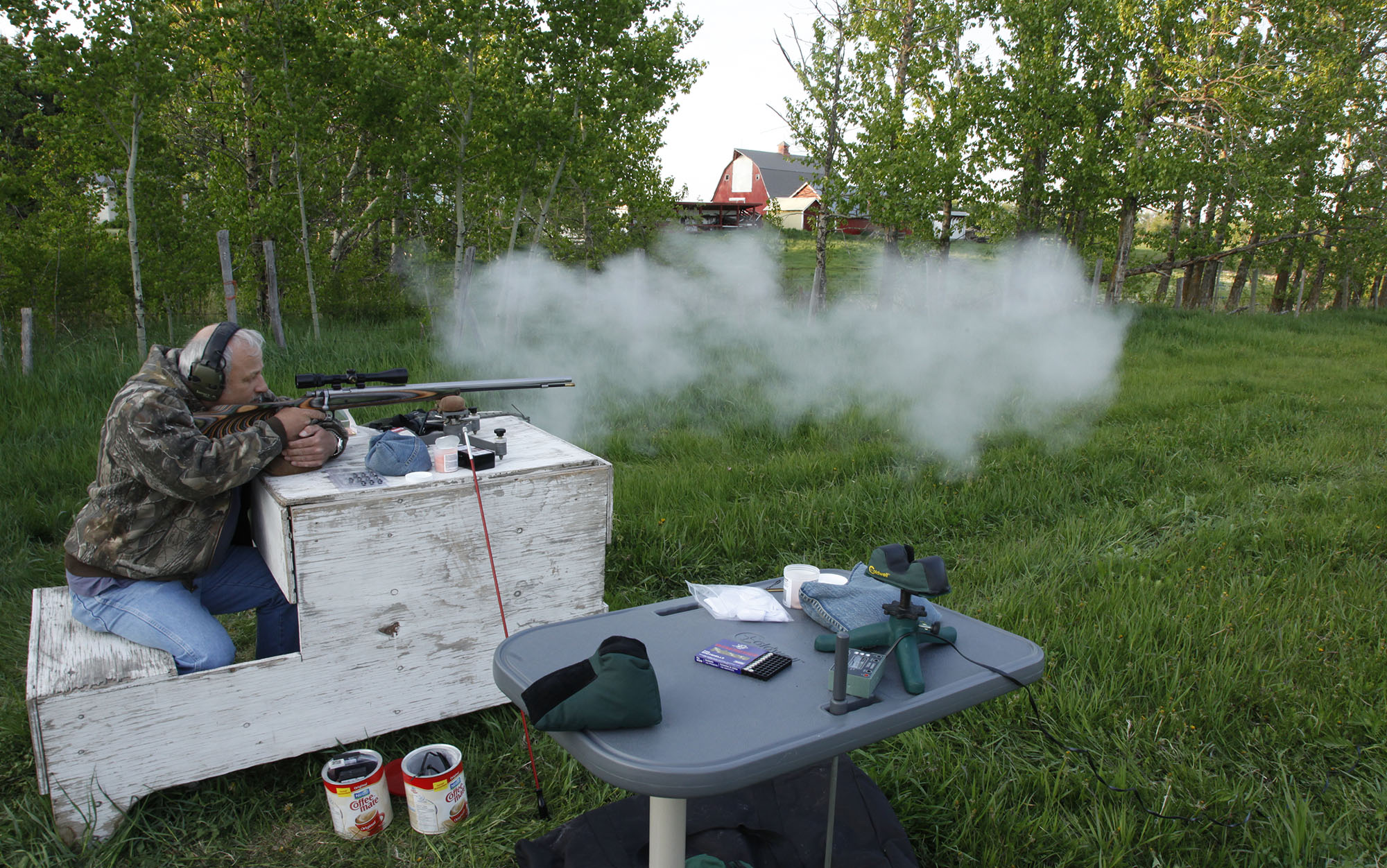
The Knight Disc Extreme features a machined bolt, Easton Carbon Core ramrod, and a selection of laminate wood stocks. This rifle consistently shot sub-MOA groups at 100 yards. I was fortunate to hunt with Tony Knight, who led the revolution in modern muzzleloader technology. Tony brought several Knight muzzleloaders, and I was given a quick rundown of features, loading tips, and techniques. I hunted with the Disc Extreme and took an excellent pronghorn antelope at 170 yards.
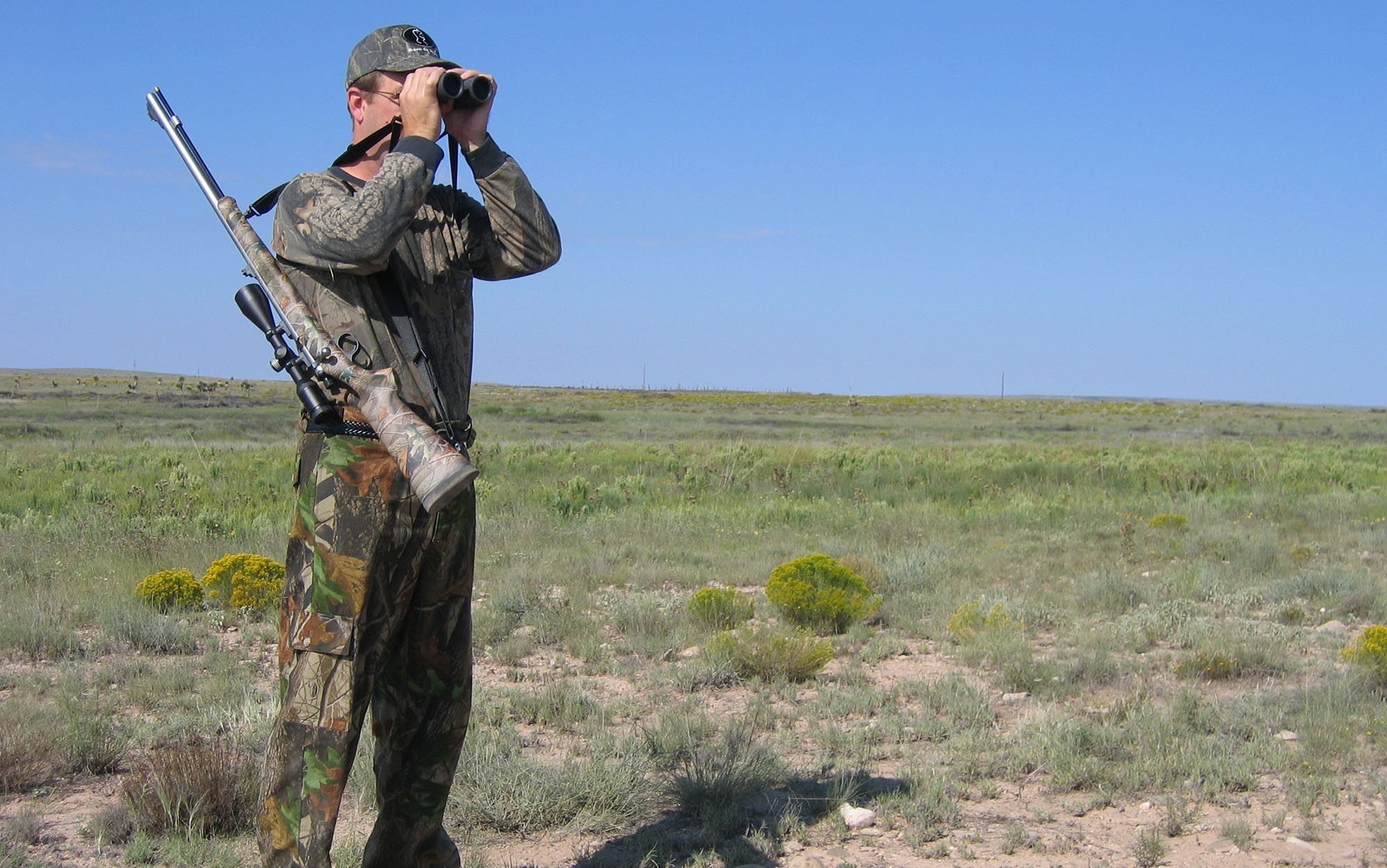
Honorable Mentions
The number of muzzleloader brands has waned over the past decade, but you can still find new, old stock muzzleloaders, which probably would have earned a spot on this list, had the manufacturers not ceased production.
LHR Sporting Arms Redemption Rifle
LHR Sporting Arms LLC introduced its first rifle, Redemption, in 2013. The Redemption .50-caliber is a break-action muzzleloader with a unique breech system. A retaining collar fastens the Adapt breech system, protecting it from the elements and ensuring consistent ignition for every shot. The collar is quickly and easily removed by hand for cleaning or changing components.
A nitride coating inside and outside of the barrel offers complete corrosion prevention, while a 24-inch Cloverleaf Precision Barrel, made by Green Mountain Rifle Barrel Co., is accurate and durable.
There is no external hammer, and the rifle is cocked with a Stealth Striker system that slides forward till it locks in the ready-to-shoot position. Depressing the decocking button will put the rifle back in safety mode. The Redemption weighs seven pounds and has a 13.5-inch length of pull. The FT2 Match Trigger breaks clean and light. A wrench, palm saver, and range rod handle are all built into one convenient carry tool. The Redemption was offered in camouflage, walnut, and composite finishes.
Thompson Center Triumph Bone Collector
The T/C Bone Collector was produced on a Triumph muzzleloader and the extra features made it a “special edition.” The stock managed recoil with a LimbSaver pad and Flex Tech Energy Burners. The Bone Collector has a 1-inch shorter length of pull than the standard Triumph, making it easy to shoulder and find the target.
Its Speed Breech XT is straightforward to remove with two fingers, even after hours on the range. Accessories like the Power Rod with a flip-out T-handle made loading faster and easier. A Weather Shield treatment on the barrel, receiver, and trigger mechanism make cleaning and maintenance a breeze.
Traditions Performance Firearms “Build-It-Yourself Rifle Kits”
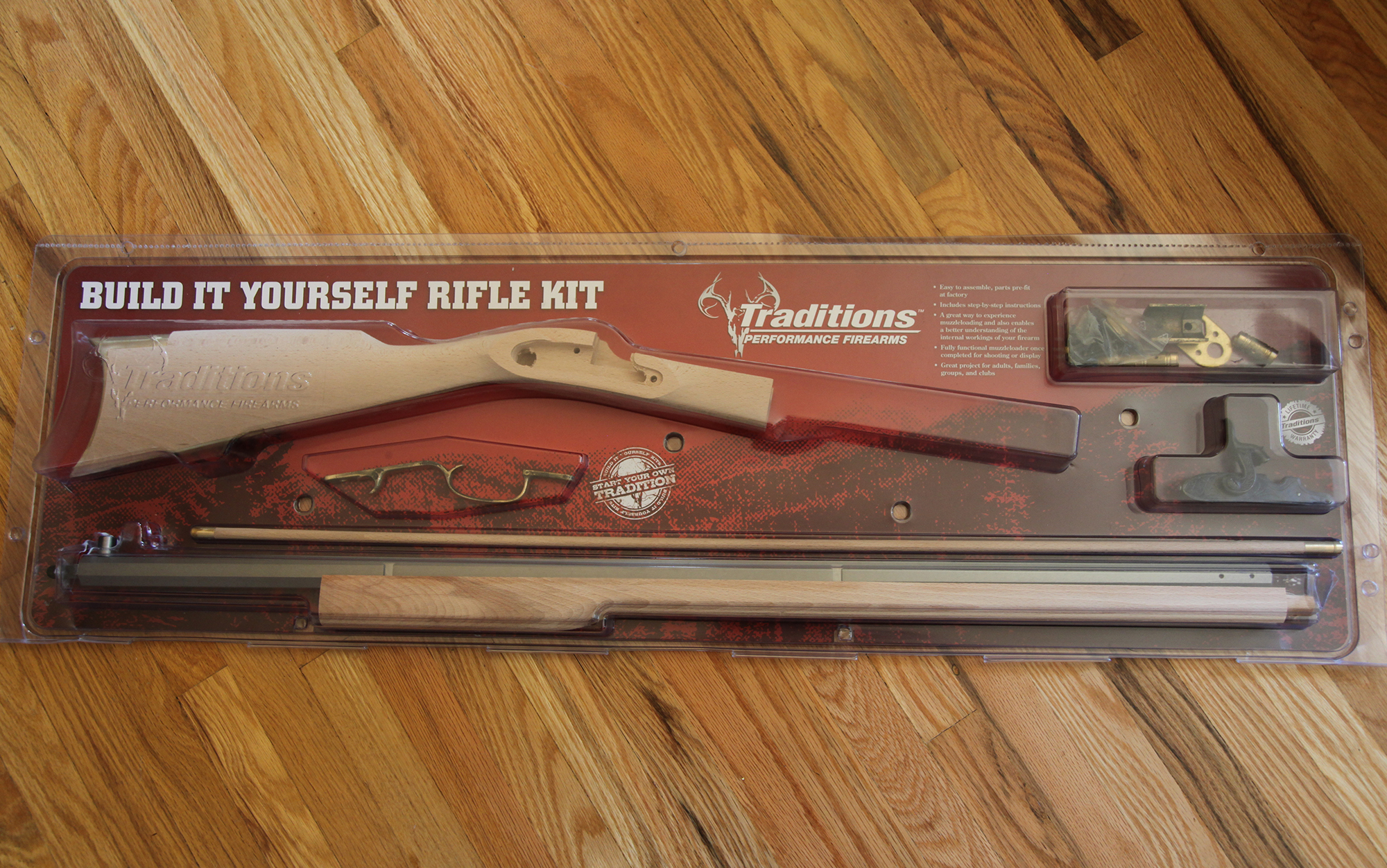
Traditions Performance Firearms has “Build-It-Yourself Rifle Kits,” with everything you need to create a custom muzzleloader with a historical appearance. There are six options: percussion models in Kentucky, Deerhunter, Crockett, Hawken Woodsman, and Frontier. The Frontier is the only one that comes with either flint or percussion ignition. All models are “old-style” guns with hardwood stocks, steel barrels, and brass components. Customize your rifle by bluing the barrel and finishing the stock as desired. Complete instructions guide you through the build and allow you to understand the principles of loading and ignition before shooting your muzzleloader. You can put together these kits in a day to full weekend depending on your skill level and how much finishing work you want to do.
Things to Consider Before Buying a Muzzleloader
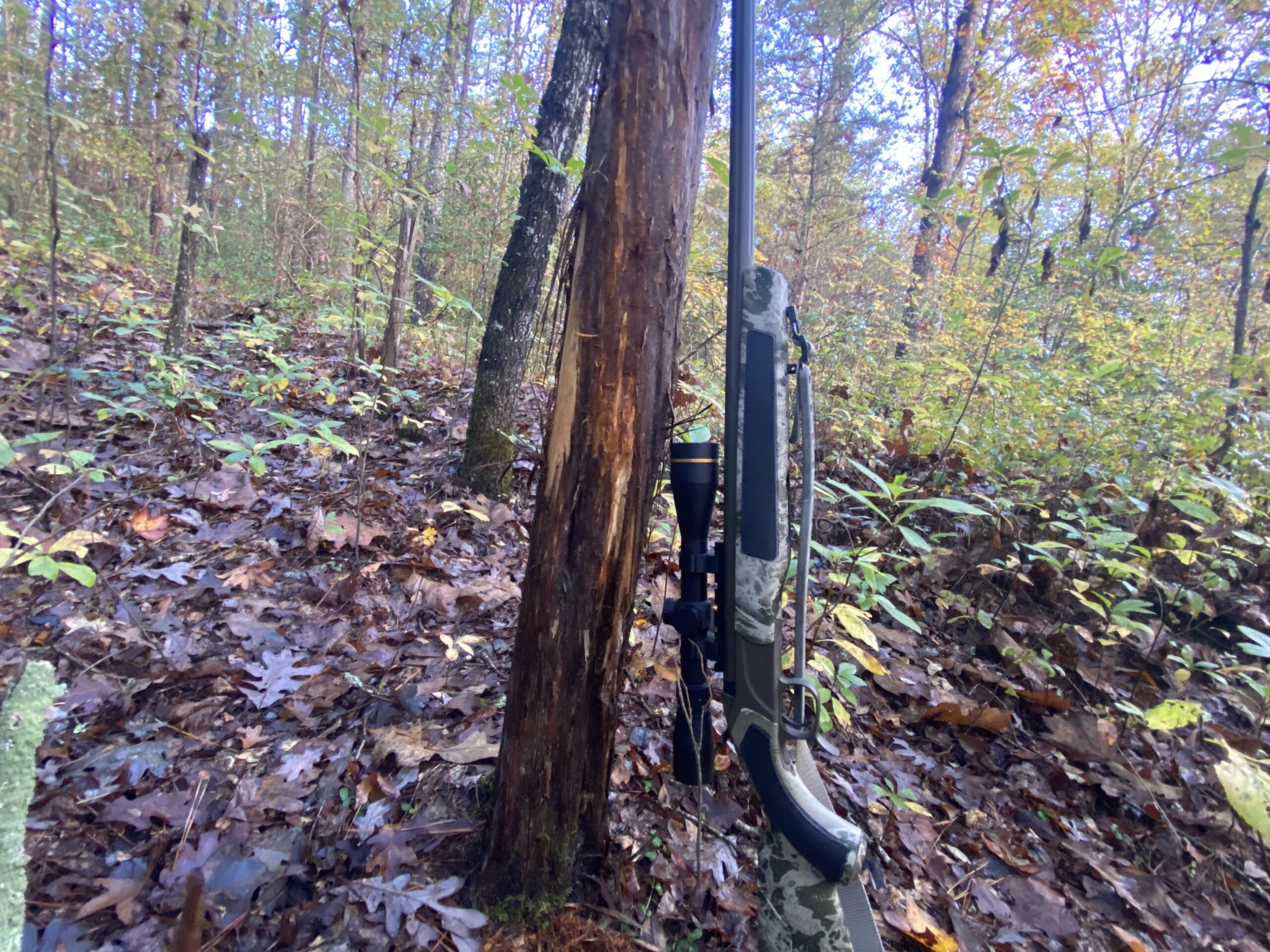
Ease of Cleaning
Not all muzzleloaders are the same when it comes to cleaning. Some require complete disassembly for cleaning and maintenance. The fewer components, the easier it is to clean a rifle. New models like the Traditions NitroFire are easier to clean than ever and use new powders, like Hodgdon Triple 7, that produce less fouling.
Shooting Components
Muzzleloaders that use a .50 caliber projectile have many options for bullets and sabot. Other calibers have limited options. Ones that use blackpowder or a substitute have many options for developing a load. Muzzleloaders with a specific powder requirement can create challenges for finding the exact products.
Cost
Most muzzleloaders range in price from $300 to $2,000 or more. Buy what suits your needs—and budget—and extend your opportunities in the field, whether long-range shooting or hunting deer from a treestand.
Why Trust Outdoor Life?
Since 1898, OL has been a leading authority in testing and reviewing hunting gear, fishing tackle, guns and shooting equipment, and much more. We have more than a century-long history of evaluating products, and we’re now bringing that expertise to online reviews. Our editors are experienced outdoorsmen and women, and most importantly, we’re trained journalists. We prioritize field testing and objective data when reviewing products. We conduct interviews with gear manufacturers and engineers as well as outdoor experts so that our readers have an understanding of how and why a product works—or doesn’t.
Advertising does not influence our gear reviews and it never will. While we always focus our coverage on standout products—because we want our readers to be aware of the latest and greatest gear—we also cover the flaws and quirks of any given product.
Final Thoughts on the Best Muzzleloaders
Muzzleloader hunting is steeped in history and tradition. Getting close for a one-shot kill has always been the challenge. The best muzzleloaders keep stretching the distance, so ask yourself: “do I want to challenge my skills to get close,” and “will my new rifle choice limit its use and seasons?” Technology pushes the envelope for hunters, and it can be challenging to keep up with the capabilities of a modern muzzleloader.
- Most Consistent Shooting: Traditions NitroFire
- CVA Crossfire
- Most Reliable: CVA Optima V2
- Best for Backcountry Hunts: CVA Accura MR
- Best Value: Traditions Pursuit XT
- Best Hammerless Long Range: Traditions Vortek StrikerFire VAPR
- Best .52 Caliber: Knight Disc Extreme
